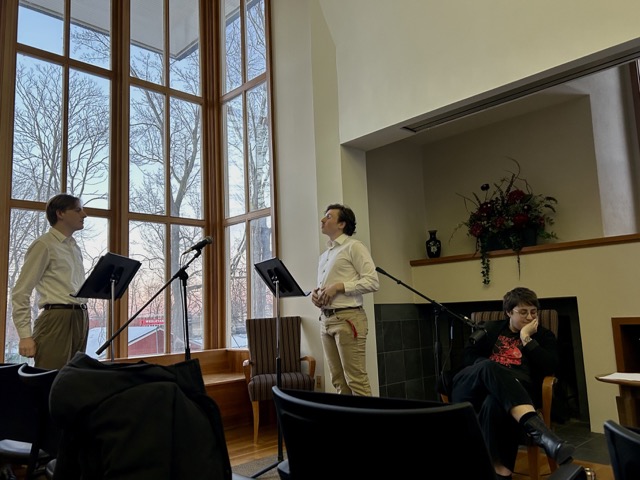
c/o Rose Chen
The Shapiro Center for Writing and Criticism’s speaker series “The Critic and Her Publics” introduced its second conversation of the semester on Tuesday, Feb. 20. The event featured Jo Livingstone, who is a medieval literature scholar, a critic, and the 2020 National Book Critics Circle recipient of the Nona Balakian Citation for Excellence in Reviewing. After receiving a BA in English literature from the University of Oxford and a PhD in medieval literature from New York University, Livingstone went on to write cultural criticism for The New Republic and currently manages the editorial website The Stopgap with Daniel Lavery. They were also one of nine writers who contributed to a 2023 letter to The New York Times condemning anti-trans bias in the paper.
The event—which took place in the McKelvey Room in the Office of Admission—put Livingstone in conversation with Director of the Shapiro Center Merve Emre.
“Our [first] conversation really centered on how a critic working today can take older works of literature and make them sing to a contemporary audience,” Emre said of her first meeting with Livingstone in 2018. “This is one of Jo’s gifts as a writer and a thinker. We see it in their criticism and their editorial work.”
The pair discussed Old English and the ways in which it differs from modern English—with Livingstone in particular noting the tactility of Old English when spoken—and their shift from isolated study of medieval texts towards criticism.
“There’s something monastic about [criticism]—it’s done often in solitude, but it’s about reaching out toward other people,” Emre said. “We’ve had many configurations of what the critic is, among them [a] medium or defendant of her people. I like the idea of the critic as a monk reaching outward toward a kind of secular heaven, as it were.”
The Critic series presents the visiting speaker with a piece of work or art to demonstrate their process of criticism. At this event, the piece was a song from the Middle Ages performed by Miles Allen ’24 and Stuart Conrad ’26, two students in Professor of Medieval Studies Jane Alden’s vocal performance ensemble course, “Wesleyan University Collegium Musicum” (MUSC438).
“We factor [in] the fact that the human voice gets much more complicated in that [time] period, especially with the church,” Livingston said. “When I hear something like this, it’s quite rare, which is why it can feel really difficult to analyze any medieval work, but…often, there’s nothing else to compare it to. There’s no way of being systematic; there’s no way of saying this embodies that in a precise way. You have to take it on its own terms, like the song is the song.”
Unlike most critics, Livingstone doesn’t believe in bad art, especially since their field of study has already had its works culled by time.
“I think bad art is what escapes your notice,” Livingstone said. “If something is bad enough to catch your eye, then you’re doing something to it, and that is beautiful…. So much of the medieval is thought of as boring and ugly and stupid, [and] was for a long time. I mean, people still call it the Dark Ages—it’s like pointing at something and calling it the ‘Rubbish Books.’ I just don’t think that these words are ‘bad.’”
The next “Critic and Her Publics” event brings to campus Lauren Michele Jackson, an American culture critic and Assistant Professor of English and African American studies at Northwestern University, on Tuesday, March 5 at 5 p.m.
Rose Chen can be reached at rchen@wesleyan.edu.